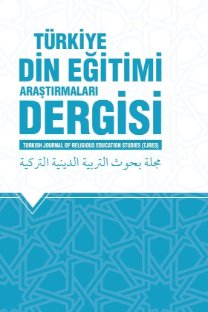Erken Çocuklukta Peygamber Tasavvuru ve Din Eğitimi: Fenomenolojik Bir Araştırma
Bu araştırmada, 4-6 yaş dönemindeki çocukların peygamber ile ilgili düşünceleri hakkında bilgi edinerek oluşturulacak müfredatlarda/eğitim içeriklerinde peygamberlerin nasıl anlatılması gerektiği ile ilgili pedagojik ilkelere ulaşmak amaçlanmıştır. Araştırmada, nitel araştırma yöntemlerinden fenomenolojik desen kullanılmıştır. Araştırmanın çalışma grubunu 4-6 yaş grubu 11 çocuk oluşturmuştur. Araştırma sonucuna göre bu dönemde çocukların Allah, Kuran ve dua ile ilgili eksik ve tutarsız olsa da bir düşünce geliştirebildikleri ama peygamber/ler ile ilgili herhangi bir düşünce geliştiremedikleri, bazı çocukların peygamberi Allah olarak anladıkları tespit edilmiştir. Bu bağlamda erken çocukluk döneminde peygamber/ler ile ilgili yapılacak din eğitiminin ilkokul yıllarında gerçekleştirilecek peygamber/ler anlatımın ön hazırlığı olacak bir yaklaşım içerisinde ele alınması gerektiği görülmüştür. Çalışmamızın en önemli bulgusu çocuklarda duyguları harekete geçirecek bir içerikte yürütülmesi gereken din eğitiminin, bilgi aktarımından ziyade çocuklara rol model olabilecek sevgi temelli bir yaklaşım içerisinde ele alınmasının gerekliliğidir.
Prophet Conception and Religious Education in Early Childhood: A Phenomenological Study
In this research, it is aimed to reach the pedagogical principles about how the prophets should be explained in the curricula/educational content that will be formed by obtaining information about the thoughts of children aged 4-6 about the prophet. In the research, phenomenological design, one of the qualitative research methods, was used. The study group of the research consisted of 11 children aged 4-6 years. According to the results of the research, it was determined that in this period, children were able to develop an incomplete and inconsistent idea about Allah, the Qur'an and prayer, but they could not develop any thoughts about the prophet/s, and some children understood the prophet as Allah. In this context, it has been seen that the religious education to be made about the prophet(s) in the early childhood should be handled in an approach that will be the preliminary preparation for the prophet(s) narration to be carried out in the primary school years. The most important finding of our study is that religious education, which should be carried out in a content that will activate the emotions in children, should be handled in a love-based approach that can be a role model for children rather than information transfer.
___
- Akturan, U. & Esen, A. (2008). Nitel araştırma yöntemleri. Ankara: Seçkin Yayıncılık.
